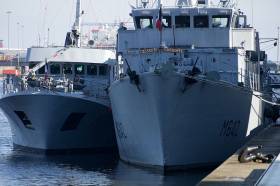Displaying items by tag: Flotilla five
Flotilla of Five French Navy Vessels On Visit
#NavalVisits - A flotilla of five French Navy vessels are currently on a call to the capital following the small ships arrival into Dublin Port yesterday morning, writes Jehan Ashmore.
Mine counter measures (MCM) vessel Cassiopée built in 1984 is of the Éridan-class. The class otherwise commonly known as the 'Tripartite' class, berthed downriver unlike the rest of the flotilla allocated along Sir John Rogerson Quay.
Accompanying the MCM Tripartite vessel displacing 615 tonnes are three sonar-towing training ships of the (BRS) type Antarès, the namesake of the leadship class which is in port. The remaining pair are Aldebaran and Altaïr. Each of the trio displace just 340 tonnes and were all commissioned in the 1990's.
The fifth visitor is represented by the Chamois class auxiliary Élan which among its duties serves as an anti-pollution vessel based in Cherbourg. The 400 displacement tonnes vessel with a large aft-deck is equipped with a hydraulic crane located at the stern. The veteran vessel in April, marked its 40th year since entering service in 1978.
An even older French Navy visitor was the Paimpolaise-class sail training ship Belle-Poule. The schooner dating to 1932 made an impressive sight during last Monday's Bank Holiday 'Parade of Sail' in Dublin Bay before heading for Bordeaux.





























































